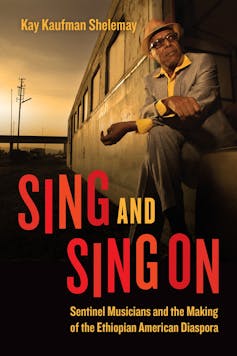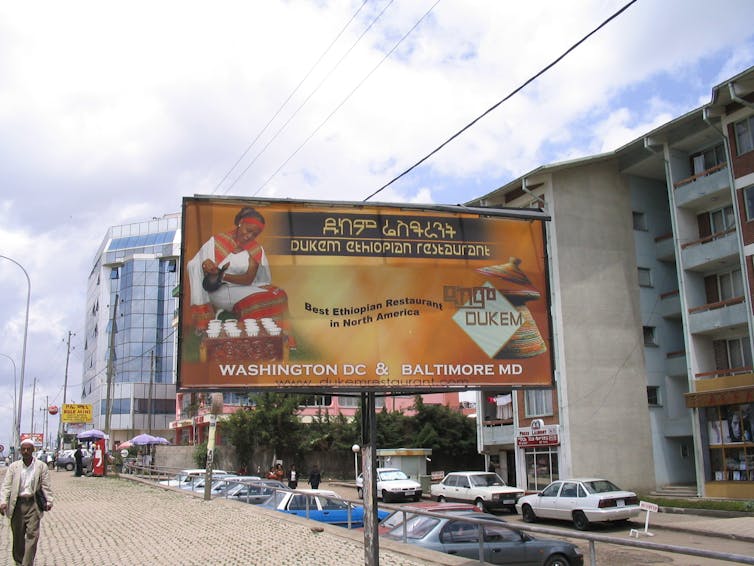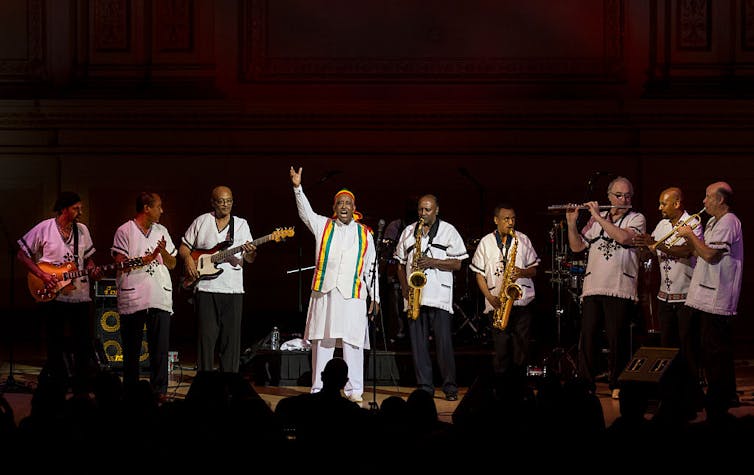The overthrow of Ethiopian emperor Haile Selassie in 1974 led to violent battle that had a very heavy affect on musicians. Sing and Sing On: Sentinel Musicians and the Making of the Ethiopian American Diaspora is the primary examine of the pressured migration of musicians out of the Horn of Africa relationship from the revolution. The ebook traces their struggles and what occurred to their wealthy and numerous music traditions after they settled within the US. Ethnomusicologist Kay Kaufman Shelemay talks about her ebook.
What occurred to trigger musicians to depart Ethiopia?
Musicians have been a part of a mass outflow of individuals from the Horn of Africa that started as a direct end result of the Ethiopian revolution. They fled as a result of the overthrow of the federal government, worry of the revolutionary Marxist army regime, and excessive violence throughout the nation – in addition to a civil battle with Eritrea. Many refugees have been Ethiopian Orthodox Christians from the Amhara ethnic group that had traditionally been near circles of energy.

Michel Temteme/College of Chicago Press
The battle triggered bloodshed throughout a area already destabilised by drought and famine. Waves of refugees crossed into Sudan and Kenya, from the place many finally made their strategy to locations all over the world.
The revolution had a very sturdy affect on musicians in all genres. They feared imprisonment and compelled musical exercise by the revolutionary regime. The army junta nationalised city and rural land, property and companies. It disbanded most established musical ensembles and imposed sturdy censorship. This was due, partially, to concern in regards to the energy of music to encourage resistance. New, explicitly revolutionary musical teams and organisations have been established to assist their new programmes.
Learn extra:
The astonishing life and music of Emahoy Tsegué-Maryam Guèbrou, the Ethiopian nun who’s died at 99
Most musical performances have been halted by curfews. Prohibitions in opposition to public gatherings rendered musicians unable to earn a dwelling. The extremely skilled musicians of the Ethiopian Orthodox Church skilled an incredible lack of status together with extreme financial pressures. These stemmed from the nationalisation of church sources.
How did you go about researching their tales?
I arrived in Ethiopia to hold out analysis for my doctoral dissertation in ethnomusicology in 1973. As outlined in my memoir, I used to be capable of stay in Addis Ababa in the course of the first two years of the revolution. There I witnessed the violence and the cessation of public musical life. I observed a rising variety of surreptitious departures.
After I returned to the US in early 1976, I encountered the primary wave of these refugees. Whereas I had gone to Ethiopia to review its musical life, by 1977, these musicians have been now settling in throughout me. I started to go to newly based Ethiopian and Eritrean Orthodox church buildings in addition to new Ethiopian eating places and outlets.

Kay Kaufman Shelemay
Over a long time, I visited many Ethiopian communities throughout the US, I attended diaspora live shows and picked up Ethiopian CDs launched in North America, I interviewed musicians about their lives and immigrant experiences. I wished to doc the position of music in new Ethiopian communities within the US.
What position did musicians play in Ethiopia?
The highly effective position of Ethiopian musicians each at dwelling and overseas has led me to time period these people “sentinel musicians”. I coined this phrase after repeatedly witnessing the best way through which these musicians, previous and current, each guarded and guided the communities they have been part of.
The phrase “sentinel” was additionally impressed by the bravery of musicians who traditionally accompanied Ethiopian troops into battle. Emperor Selassie had established the Imperial Bodyguard Orchestra and a jazz band as a part of his elite private militia.
Singers and instrumentalists have lengthy been acknowledged as pivotal figures in Ethiopia. They guided the transmission and efficiency of cultural traditions in domains from worship to leisure whereas providing inspiration and luxury throughout instances of hardship.
How was this position continued within the diaspora?
The position of the musician in society is heightened in instances of battle and compelled migration, when music and its efficiency might convey controversial meanings. In Ethiopian languages, there’s the apply of using double meanings in songs, masking the true intent of a textual content. This apply, termed “wax and gold”, is present in Ethiopian spiritual and secular poetry, in on a regular basis speech, and in lots of track lyrics.
The wax is the apparent outer that means of the phrases whereas the gold is the that means hidden inside. The time period is borrowed from the “misplaced wax course of” of casting smelted gold in wax moulds. Composers and conventional improvisational singers disguise the that means of their songs, masking important or controversial data.
Within the diaspora, some sentinel musicians have continued to make use of wax and gold, however musicians’ roles have additionally expanded to include new and totally different significances.

Jack Vartoogian/Getty Pictures
Some have fairly actually served as “sentinel stars”. They led the best way to new locales, established transnational networks and based new establishments – cultural organisations, church buildings, eating places and golf equipment – endeavor initiatives in neighborhood constructing. Furthermore, musicians have supplied emotional assist and therapeutic to their displaced communities via their music.
All genres of Ethiopian music, from sacred to secular, have needed to adapt creatively to their new properties overseas. Some diaspora musicians, like Ethiopian-Canadian singer Abel Tesfaye (previously The Weeknd), have innovated private types which have risen to the highest of worldwide charts. All through the worldwide diaspora, Ethiopian conventional music related to totally different ethnic communities actively survives and is carried out at occasions akin to weddings and vacation events.
On the similar time, Ethiopian musicians of many various backgrounds each at dwelling and within the diaspora carry out worldwide musical types, starting from jazz to reggae to rap. These are sometimes inflected by distinctive Ethiopian melodies and rhythms. Some new musical repertories have emerged which can be shared by Ethiopians at dwelling and overseas, notably the efficiency of vernacular hymns that turned in style in the course of the revolution. They’re sung internationally in Ethiopian church buildings by choirs of ladies and women.
Why do their tales matter?
Musicians’ tales shed new mild on the plight of refugees and the method of pressured migration, offering a fuller understanding of the highly effective position of music and musicians inside quickly altering societies.
Learn extra:
Hachalu Hundessa: charismatic musician who wasn’t afraid to champion Ethiopia’s Oromo
Musicians use music and its efficiency to carry folks collectively and to ascertain and maintain neighborhood values and ethical requirements. By their tales and lived experiences, we will admire the affect of musical creativity, and the methods it’s typically deployed in opposition to formidable odds.




